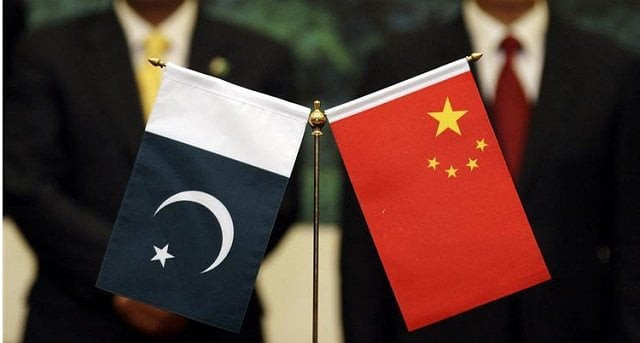Pakistan, China to amend railways ML-1 agreement
Decide to reduce length of CPEC’s largest project from 1,872 km to around 1,680 km

PHOTO: REUTERS
The decision to split the project, which was once planned to be completed in three years, suggests that work on the single-largest project of the China Pakistan Economic Corridor (CPEC) will now take at least six years to complete – from the day of its groundbreaking.
It has been agreed to reduce the length of the project from 1,872km to around 1,680 km, according to the government sources. The government has also decided to exclude the component of building a new 163km long double line between Karachi and Hyderabad from the scope of the framework agreement.
It has been decided that this component will be executed on Public-Private Partnership or Build Operate and Transfer Basis if declared feasible after the commercial and financial feasibility study, said sources in the Ministry of Railways.
Pakistan to pay China $40b on $26.5b CPEC investments in 20 years
Similarly, the Havelian-Textile rail track has also been excluded from the project. The ML-I project will be completed on the Engineering Procurement and Construction (EPC) mode under a sovereign deal.
But like the Pakistan Muslim League-Nawaz (PML-N) government, the government of the Pakistan Tehreek-e-Insaf (PT) has also failed to decide whether the Chinese loan for the ML-I project will be taken on the books of the Finance Ministry or that of the Ministry of Railways. In case the loan is taken on the books of the Finance Ministry, its servicing will also be the responsibility of the federal government.
An addendum to framework agreement will be signed to amend the Article-II to implement the ML-I project in three phases. According to sources in the Ministry of Planning and Development, the supplement agreement will be signed during Prime Minister Imran Khan’s upcoming visit to China. Khan will visit China on April 27 on an invitation of Chinese President Xi Jinping.
The original plan was to construct and upgrade the rail infrastructure between Peshawar and Karachi in two phases and to complete it by 2022. However, so far, both the sides are at the stage of finishing the feasibility study.
The sources said the Chinese consortium will submit the report by April 15 on the feasibility design that will provide a base for calculating the cost of the project. Originally, it had been estimated that the project would cost $8.2 billion, making it the single largest scheme under CPEC.
According to the original framework agreement of May 2017, China will provide 85% of the project cost as a concessionary loan. The project has been declared strategically important by both countries.
This month Minister for Planning Khusro Bakhtiar had said the government has decided to split the project into more than two phases and to drop some sections that were part of the original plan of constructing 1,872-kilometer long line of the Pakistan Railways. The cabinet had approved to set up an implementation committee to review cost, scope, and financing of the ML-I project.
Three Phases
Under the phase-I of the project, four sections will be completed in a period of three to four years. Except for one, almost all these section will be built from Rawalpindi to Lahore.
A 52-km-long second line for running 120km per hour high-speed train will be constructed from Kaluwai to Pindora. The other sections include upgrading of Nawabshah-Rohri section of 183km, Lalamusa-Rawalpindi section of 118km, and Lahore-Lalamusa section of 132km. The upgrading of Walton Railway Academy with a reduced scope is also part of phase one.
In the second phase that will also take over three years to complete, Multan-Lahore section and Kaimari-Hyderabad section will be constructed. The dry port at Havelian will also be part of the second phase but its scope has been reduced.
In the third phase, Pakistan and China have agreed to construct a Rawalpindi-Peshawar section and Hyderabad-Multan section. The Taxila-Havelian track has been dropped from the ML-I scope.
The sources said Chinese contractors have the technical capacity and financial muscles to complete the three phases simultaneously but the Pakistan Railways cannot afford to close its commercial traffic and the project has to be implemented in phases that will take more time.
Secondly, Pakistan does not have enough fiscal space to allocate the rupee component in the development budget in one go. At present, the Pakistan Railways is picking up less than 4% of the traffic volume of the country, which the government intends to increase to at least 20% by 2025.



















COMMENTS
Comments are moderated and generally will be posted if they are on-topic and not abusive.
For more information, please see our Comments FAQ